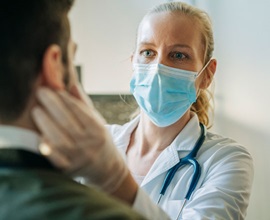
Don't be afraid to go to the hospital; hospitals are safe places for care. Protective measures are in place to prevent the spread of COVID-19.

Severe Symptoms
If you are experiencing a medical emergency, call 911.
If you are experiencing the severe symptoms listed below, go to the nearest hospital or emergency room right away. Do not ignore your body's warning signs. Delaying treatment can have serious, even deadly consequences.
Symptoms that may indicate a life-threatening emergency include:
- Shortness of breath or difficulty breathing
- Chest or upper abdominal pain or pressure
- Sudden dizziness, weakness or fainting
- Sudden change to vision
- Confusion, sudden change in your mental status
- Sudden or severe pain
- Uncontrolled bleeding
- Severe vomiting or diarrhea
- Vomiting or coughing blood
- Difficulty speaking
Severe COVID-19 symptoms to watch include:
- Shortness of breath while at rest
- Dry cough, fever, breathing getting more difficult
- Significant or worrisome cough that is increasing
- Confusion or sudden change in mental status
- Chest pain
- Low oxygen levels
- Extreme sleepiness or inability to wake
- Blue face or lips

Moderate Symptoms
If you are not experiencing shortness of breath, but are getting sicker, you may need to be evaluated by a medical professional. If you’re concerned, we want to see you. Call your primary care provider or visit an urgent care facility. Find a health care location.
Symptoms to watch closely, especially in combination:
- Fever with muscle aches and fatigue
- Reduced sense of taste and smell
- Severe diarrhea and other stomach problems
- Increasing dry, persistent cough that is worsening

Mild Symptoms
If you think you were exposed to COVID-19, or have mild symptoms, do NOT come to the hospital for a test. If you have mild symptoms, you can schedule a test at certain St. Luke’s clinics.
If you are experiencing mild symptoms:
- Stay at home. Self-quarantine is critical to stopping coronavirus spread.
- Use St. Luke’s self-triage tool in myChart; it will help determine what to do next. If you need a myChart account, create one here.
- If self-triage indicates you should be tested, you can schedule an appointment in myChart.
- Our COVID-19 hotline offers instructions or assistance at (208) 381-9500.
- Wear a mask, social distance, wash your hands often, and disinfect high-touch surfaces.
COVID-19 Resources
Navigating COVID-19 Together
St. Luke's is prepared to support our patients and community as we enter the fall flu season with COVID-19 still spreading across Idaho. Our commitment to safe care includes coronavirus testing, visitor screening, enhanced safety practices and more.

